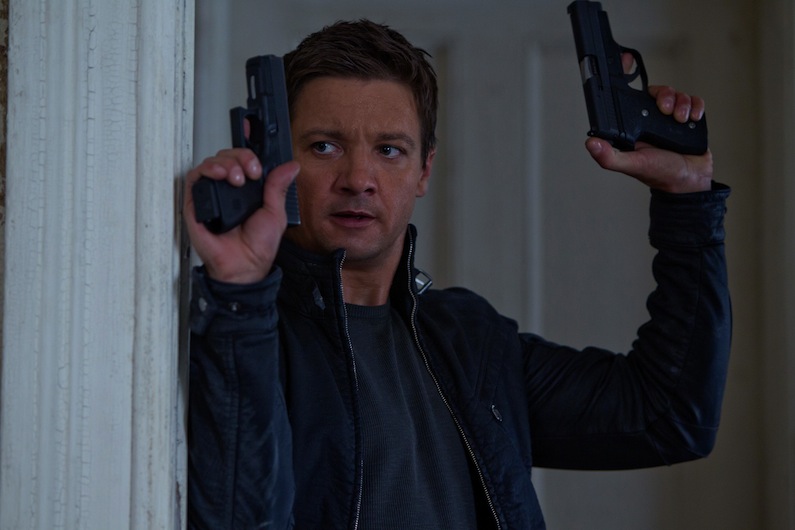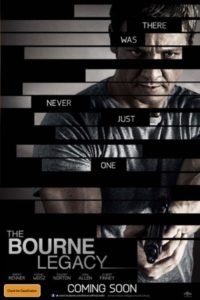The legacy of Bourne falters with a series entry that follows rather than leading, and an overall product that is less than the sum of its parts.
[stextbox id=”grey” caption=”The Bourne Legacy (2012)” float=”true” align=”right” width=”200″]
Director: Tony Gilroy
Writer: Tony Gilroy, Dan Gilroy
Runtime: 135 minutes
Starring: Jeremy Renner, Rachel Weisz, Edward Norton, Stacy Keach
Distributor: Universal
Country: US
Rating (?): Wait for DVD/Blu-ray (★★½)
The original Bourne films, based loosely on the novels of Robert Ludlum, unquestionably changed the face of the spy/action genre. Influencing the style of James Bond reboot Casino Royale, directors Doug Liman and Paul Greengrass crafted a visual style that was based heavily in real-world issues and scenarios. The refreshingly intelligent scripts came from Tony Gilroy, who directs the series for the first time with The Bourne Legacy. Yet while all the pieces are still there, this latest outing fails to live up to its predecessors.
Gilroy’s screenplay has one thing in common with its stablemates, merely lifting the title from Eric Van Lusbader’s novel but designing its own direction within the cinematic universe. Following the events of The Bourne Ultimatum, the CIA scrambles to cover up its loose ends. The previously unseen puppet master Eric Byer (Edward Norton) orders the termination of all black ops, along with their agents. However, supercharged spy Aaron Cross (Jeremy Renner), an agent of Operation Outcome, escapes his bullet and begins looking for answers. With the help of scientist Dr. Marta Shearing (Rachel Weisz), Cross hopes to expose the organisation for its nefarious deeds.
With neither Matt Damon or Paul Greengrass electing to return to the series, Gilroy was left with the dilemma of how to move on from the effective conclusion to the saga in the previous film. This film may be about the consequences of that earlier outing, but it is also very much a retread of what came before. Exchanging one action hero for the next is the primary achievement of The Bourne Legacy, which more or less brings a similar ensemble cast mixed with neck-breaking action. Like the rest of the series, an otherwise smart women is dragged along for the ride, and several explosive chases later, both parties are in the moral right against a powerful government agency who wants to keep doing bad things in the name of liberty.
While all the moving bits of the mechanism are the same, what ultimately undermines The Bourne Legacy is the protagonist’s lack of a compelling quest. Where Jason Bourne’s journey was clear, a literal voyage of self-discovery against the odds, all Cross wants to do is get more of his government issue medication. On this most tenuous of premises, we are bounced from Alaska to New York and the Philippines and back again, with a conclusion that leaves us far from satisfied. Indeed, as the first strains of Moby’s familiar “Extreme Ways” begin to play again, you’d be forgiven for wondering if that’s all there is.
Renner is a capable lead, stepping up from second fiddle action hero in The Avengers to deliver on the promise of The Hurt Locker and similar franchise entry Mission: Impossible – Ghost Protocol. Not having to do much beyond running and gunning, we don’t get the same emotional connection that we did to lost boy Bourne, and the relationship Cross has with Shearing never approaches the genuine romance of the original series. However, new additions Edward Norton and veteran Stacey Keach slide effortlessly into the world of espionage as if they were always there, pulling the strings throughout the first three films. A string of cameos from returning cast members helps give this some sense of continuity as well.
As the film builds to a predictably spectacular chase sequence, this time trading Mini Coopers for motorbikes, an impressive set-piece plays out that make actually matches the earlier chases inch for inch for pure adrenaline. Yet it is difficult to shake the feeling that we’ve been here before, and that’s mostly because we have. Devoid of the originality of the first films, and further evidence that you can’t force lightning to strike twice, The Bourne Legacy is merely another disciple of the Bourne-school of action filmmaking, instead of being the industry leader it once was.
The Bourne Legacy is released in Australia on 16 August 2012 from Universal.






